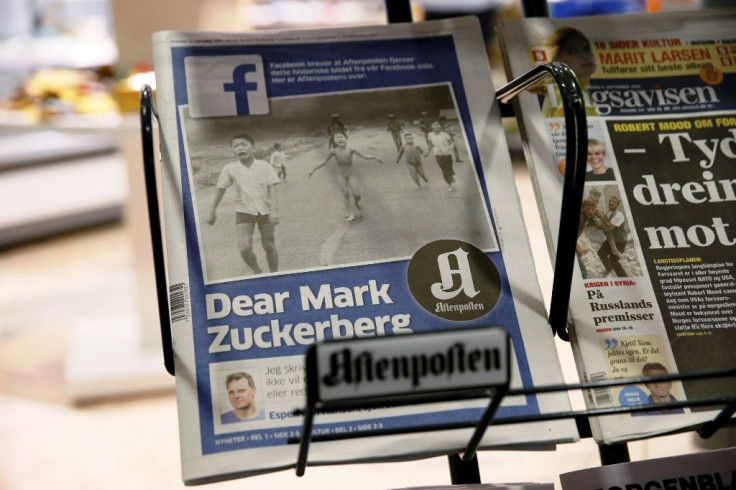Napalm Girl Photo Uncensored: Facebook Reinstates Iconic Vietnam War Photo After Censorship Outrage

Facebook backtracked Friday on its decision to censor the iconic “napalm girl” photo from the Vietnam War after CEO Mark Zuckerberg was accused of abusing his power by a Norwegian daily. The tech giant triggered outrage in Norway after it took down the 1972 image of naked 9-year-old Kim Phuc running from a napalm attack and screaming in pain.
Facebook issued a statement saying it “listened to the community” and recognized the “global importance” of the photo.
“Because of its status as an iconic image of historical importance, the value of permitting sharing outweighs the value of protecting the community by removal, so we have decided to reinstate the image on Facebook where we are aware it has been removed,” the California-based company said.
“It will take some time to adjust these systems but the photo should be available for sharing in the coming days. We are always looking to improve our policies to make sure they both promote free expression and keep our community safe,” it added.
The controversy arose after Facebook removed Norwegian writer Tom Egeland’s post that featured the Pulitzer prize-winning photograph by Nick Ut on the grounds of nudity. After deleting the post, Facebook suspended Egeland’s account.
Following this, Norway’s largest newspaper by circulation Aftenposten reported the suspension using the same photo for its article that was later shared on the newspaper’s Facebook page. However, the social media giant messaged the publication asking it to “either remove or pixelize” the image. It went ahead and deleted the article before Aftenposten could respond, according to the newspaper’s Editor-in-Chief Espen Egil Hansen who wrote an open letter to Zuckerberg criticizing the company’s censoring and news distribution policies.
Norway’s Prime Minister Erna Solberg joined the protest and posted the image on her profile and Facebook deleted that too. Following this, the Conservative prime minister urged the company to “review its editing policy.”
The anger fanned out of Norway. Denmark’s journalism requested people to share Hansen’s open letter and Germany’s Justice Minister Heiko Maas said that “illegal content should vanish from the Internet, not photos that move the whole world.”
Later, Solberg welcomed Facebook’s decision to remove censorship from the photo.
“That’s very good, I’m a happy prime minister,” Solberg reportedly said. “It shows that using social media can make [a] political change even in social media.”
© Copyright IBTimes 2024. All rights reserved.






















